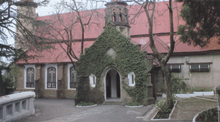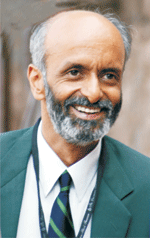Ranked among the top ten residential schools countrywide, this 161-year-old pioneer co-ed school has built itself an excellent reputation for providing holistic primary-cum-secondary education
 Arguably the first co-educational boarding school in the world, since it received its first batch of 14 boys and girls who camped in the open in Sanawar (5,600 ft above sea level) in the foothills of the Himalayas on April 15, 1847, waiting for the school’s first buildings to be completed before the monsoon, the Lawrence School, Sanawar has built itself an excellent reputation for providing holistic class V-XII education. In the EducationWorld-Cfore 2008 Survey of India’s most respected schools (EW September 2008), Lawrence Sanawar was ranked among the top five residential schools in north India, and among the top 10 country-wide. Moreover it was rated particularly well on the parameters of co-curricular education, faculty competence and quality of leadership.
Arguably the first co-educational boarding school in the world, since it received its first batch of 14 boys and girls who camped in the open in Sanawar (5,600 ft above sea level) in the foothills of the Himalayas on April 15, 1847, waiting for the school’s first buildings to be completed before the monsoon, the Lawrence School, Sanawar has built itself an excellent reputation for providing holistic class V-XII education. In the EducationWorld-Cfore 2008 Survey of India’s most respected schools (EW September 2008), Lawrence Sanawar was ranked among the top five residential schools in north India, and among the top 10 country-wide. Moreover it was rated particularly well on the parameters of co-curricular education, faculty competence and quality of leadership.
The 161-year-old school was promoted by Sir Henry Lawrence (1806-1857) who shouldered the financial burden in the first decade of the school’s existence, after which it passed under the direct control of the British crown — “a most unusual arrangement not repeated in any English public school” — during which period it acquired a strong tradition of military training, and sent several contingents to the European battlefields of the First World War. In appreciation of this contribution, the school was redesignated the Lawrence Royal Military School in 1920. After 1947 when the country wrested its independence from the British and “the bulk of the staff and children returned to the UK”, control of the school passed to the Union ministry of defence, and two years later to the ministry of education. But in 1953 by a special resolution of the government of India, supervision of this pioneer co-ed school was vested in an autonomous Lawrence School (Sanawar) Society.
Since then, over the past 61 years after independence, Lawrence School Sanawar has earned itself a sterling reputation as India’s most respected traditional (cf. the new genre ‘international’) co-ed boarding school with a total strength of 745 students, including 260 girl children who follow the curriculum of the Delhi-based Central Board of Secondary Examination (CBSE). Lawrence Sanawar is also a member school of the Indian Public Schools Conference and the Headmasters Conference (UK).
 “The distinguishing characteristic of this 161-year-old school is that we have been successful in combining our unique history and traditions with thoroughly contemporary infrastructure and pedagogies. And the success of this institution is evidenced by Lawrence School Sanawar consistently producing leaders in all walks of life, good citizens who are confident, aware, knowledg-eable and yet compassionate,” says Praveen Vashist, an alumnus of Lawrence Sanawar, St. Stephen’s and Delhi University where he read law. In 1990 Vashist signed up with his alma mater as a social science teacher but took a break of three years (1993-96), during which he served as legal aid counsel to the president of Zambia before returning to Sanawar in 1996. In December 2004 he was appointed headmaster of this pace-setting boarding school which receives six admission applications for every vacancy.
“The distinguishing characteristic of this 161-year-old school is that we have been successful in combining our unique history and traditions with thoroughly contemporary infrastructure and pedagogies. And the success of this institution is evidenced by Lawrence School Sanawar consistently producing leaders in all walks of life, good citizens who are confident, aware, knowledg-eable and yet compassionate,” says Praveen Vashist, an alumnus of Lawrence Sanawar, St. Stephen’s and Delhi University where he read law. In 1990 Vashist signed up with his alma mater as a social science teacher but took a break of three years (1993-96), during which he served as legal aid counsel to the president of Zambia before returning to Sanawar in 1996. In December 2004 he was appointed headmaster of this pace-setting boarding school which receives six admission applications for every vacancy.
But although Lawrence Sanawar has acquired an excellent reputation for its holistic primary-cum-secondary education with a near optimal mix of academic rigour and co-curricular and extra-curricular activities, the school’s unique selling proposition is its location near Sanawar, a charming village (pop. 600) sited in the foothills of the Himalayas. Situated on a rural hilltop, the school sprawls over 139 acres of pine and evergreen wooded hills and dale, offering students clear, pollution-free air, a cool wonderland of rambling paths, flowering bushes, exotic birdlife and several playing fields including the famous Barne Field. Games facilities include an indoor sports complex with a solar-heated swimming pool and squash and badminton courts, and a newly built basket ball court.
“Co-curricular and extra-curricular education are extremely important in the school curriculum, as is life skills education, so that every student is multi-faceted and becomes self-reliant,” says Vasisht.
Yet while this vintage school’s management is committed to balanced, rounded development of every student, it pays equal attention to academics and constantly improving learning outcomes. The school’s scholastic perfor-mance measured in terms of average percentage grades of students in CBSE’s class XII school leaving exam, has risen from 68 percent in 2005 to 75 percent in 2008 (average batch strength of 90). This is the consequence of the management having invested heavily in developing the academic infrastructure.
Recently a new fully-wired learning resource centre which incorporates the school’s automated library equipped with 35,000 volumes, 50 journal subscriptions and 500 classic movies, became operational. Over 30 new desktop computers with internet facility have been recently installed bringing the total to 140 computers.
Committed to continuous improve-ment and upgradation of this heritage school, the board has approved a new science block with five state-of-the-art laboratories to be built at a projected cost of Rs.3.5 crore. Coterminously Lawrence Sanawar’s classrooms are being wired by the Delhi-based ICT-in-education leader Educomp Solutions Ltd. “ I am very optimistic about the future of this vintage school which offers a healthy mix of extra-curricular and academic education, enriched by infusion of ethical and moral instruction. On a wider front as well, I am optimistic about the future of Indian education because of widespread grassroots awareness of the importance of foundational school education. In this connection we believe that experienced schools like Lawrence Sanawar can make a great contribution by setting standards and benchmarks of excellence,” says Vashist.
Quite obviously the Lawrence Sanawar story is far from over.
|
Admission & fees
Lawrence School, Sanawar is a class V-XII co-educational boarding school affiliated with the Central Board of Secondary Education, Delhi. Admission into the school is open to students aged between eight years nine months and 16 years three months. Applications are usually accepted for children seeking entry into classes V and VII. A limited number of applications are also considered for entry into class XI. Admission into these classes is on the basis of an entrance test held in November every year.
Tuition fees (per year) including board and lodging:
Civil: Rs.152,700; Defence: Rs.108,200
For further information contact the Dean of Faculty, Lawrence School, Sanawar 173 202, District Solan, Himachal Pradesh, India. Tel: +91 1792 261208/261209. Fax: +91-261210; e-mail: sanawar@glide.net.in; website: www.sanawar.com
|
Dilip Thakore